🌟 Developer Spotlight: kazu and Shibo
2024年 5月 12日
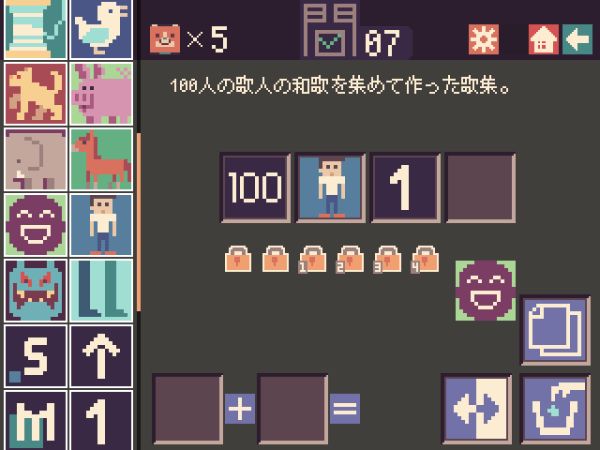
Do you like mini-games? I think that short browser games are attractive not only because they are easy to play, but because they are often crafted around one or two interesting concepts that have been honed to perfection. They are like a window directly into what the creators were thinking as they were putting the game together, seeing which concepts were most important to keep, and sensing the passion and excitement they had for their game.
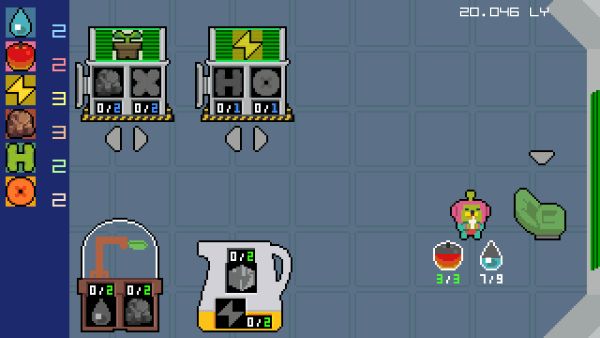
Appollo: The AstroDiver, a cute resource-management survival game in space
Even though I have a hefty backlog of games that I bought yet haven’t cleared, I often find myself pushing them away in favor of browsing through free mini-games I find online. (I’m pretty sure I have played far more mini-games than “full” games, though I haven’t actually counted.) Mini-games are often short and free, and if you have the energy to go looking for them, you may find something you really love. If you decide to embark on the quest to find your new favorite title, you should definitely start with a game by developer duo kazu and Shibo.
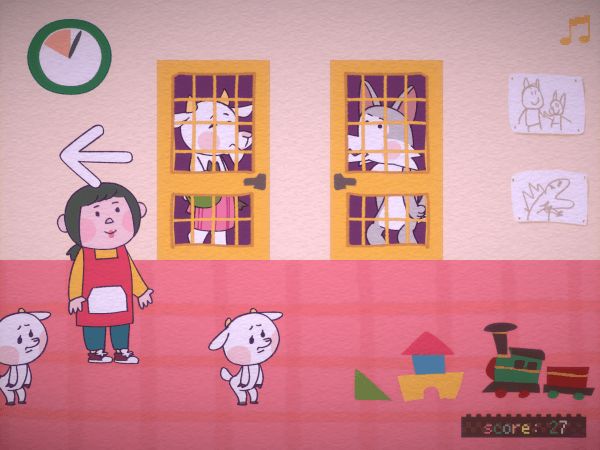
PICKUP PEEK - Find My Mom, quick reflex game to unite your preschool charge with the correct mother.
kazu and Shibo are a husband and wife duo who are active participants of several game jams, and have full libraries on both itch and Unity Room. Together, they have created many mini-games that range from arcade-like endless score attack games to toy-like puzzle boxes that you can clear in a single sitting. Their games are marked with a sense of playfulness and are filled with cute, colorful pixel art. They are always a delight to play.
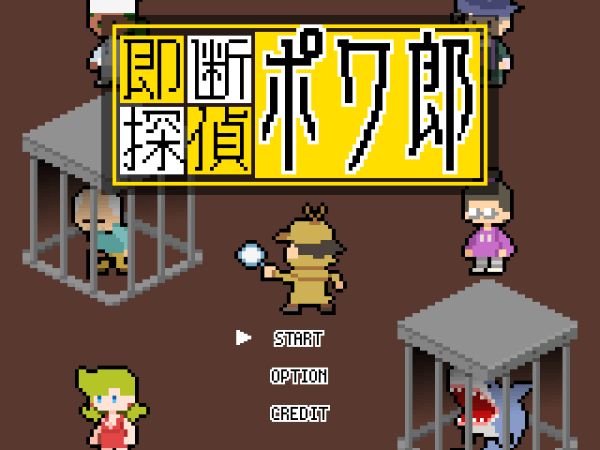
即断探偵 ポワ郎 (Quick Detective Poirot), a high-speed mystery-solving quiz game.
Perhaps the game that best encapsulates this team’s sense of snappy and fun design is 即断探偵 ポワ郎 (Quick Detective Poirot), a speedy mystery game where the player must instantly deduce which of two suspects is the murderer based on circumstantial evidence found at the crime scene. The catch is that the player only gets a few seconds to glance at the scene before having to pronounce judgment, and if you get it wrong, it’s game over! The music is jazzy and upbeat, and I got a kick out of the different murder methods and suspects.
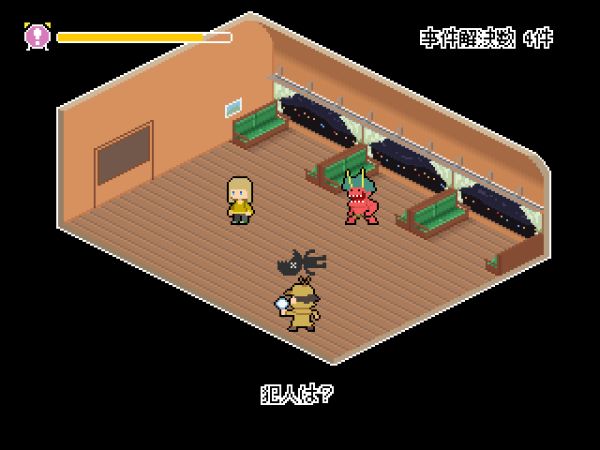
Who is the more likely culprit, the nondescript passenger, or the giant red ogre? Think fast, you only have a couple of seconds to answer!
You will face down a delightful rogues’ gallery ripped straight out of pulp fiction: Edo Era samurai, towering dinosaurs, clowns with vials of bright green poison, cute little grannies hiding daikon-slicing knives. The imaginative-yet-logical crime scenes combine with the snap deductions to create a kind of fast-paced arcade quiz game, a new and unique experience that had me hooked.
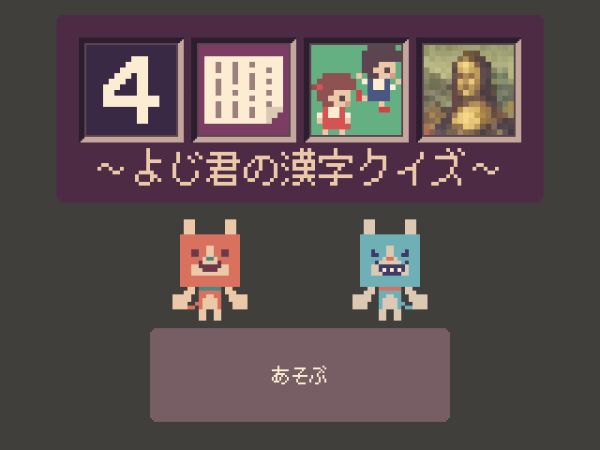
四字戯画 ~よじ君の漢字クイズ~ (Four-Character Caricatures: Yoji-kun's Kanji Quiz), puzzle game where you solve for four-character kanji phrases, called yojijukugo.
四字戯画 ~よじ君の漢字クイズ~ (Four-Character Caricatures: Yoji-kun’s Kanji Quiz) is another quiz game, but also feels completely different to play. Whereas Poirot relied on quick reflexes and speed, Yoji-kun is a thinky word game. In Japanese, there are phrases and idioms that can be written in four kanji characters, called 四字熟語 (yojijukugo). And since kanji are themselves based on pictograms, the game here is to combine picture tiles together to create the four-character phrases.
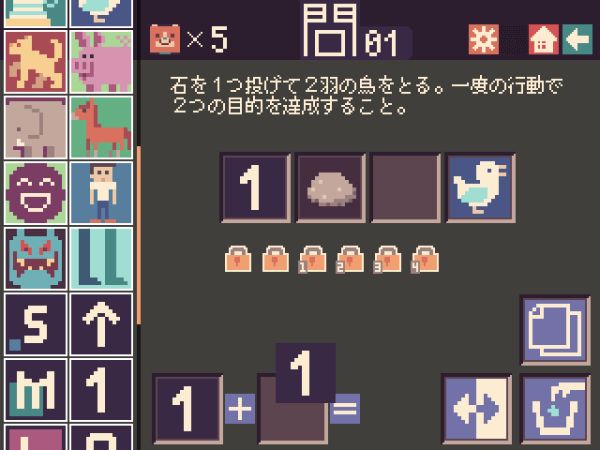
Half the puzzle is knowing what the four-character phrase is, and the other half is figuring out how to depict that using the picture tiles.
For example, the answer to the first puzzle is 一石二鳥 (isseki nichou, two birds with one stone). You have picture tiles for “one,” “stone,” and “bird,” but how do you get the tile for “two”? At the bottom of the screen, there is a blank equation where you can add two tiles together to create a third. So naturally, if you add “one” and “one” together, you get “two” for your phrase. As you progress through levels, you gain different ways of manipulating the picture tiles to create the required kanji. Although you do need to know quite a bit of kanji and yojijukugo to fully appreciate the game, it can be a great opportunity for intermediate to advanced learners of the language. And it should go without saying, it can be fiendishly hard even for people whose first language is Japanese!
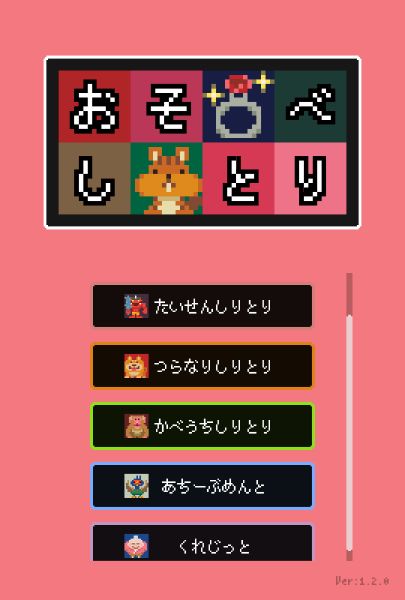
おそるべしりとり (Osorubeshiritori), a twist on the classic Japanese word game.
Combining elements of these two games, the duo came up with おそるべしりとり (Osorubeshiritori, or Terrifying Shiritori, a Japanese word-chaining game where you start a new word with the last character of the previous word.) Unlike regular shiritori, players must first select a picture tile from the main grid and then type in a word that both fits the rules of shiritori and also matches the picture, which adds a new layer of difficulty onto the popular word game.
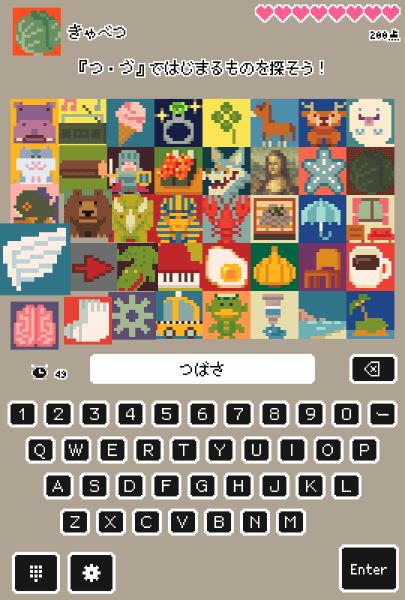
Chain together words using the final character of the previous word, like with kyabetsu (cabbage) linked to tsubasa (wing). It's a fun way to brush up on your Japanese!
Picture tiles can be used in different ways; for example, a “shoe” can also be read as a “sneaker” or “footwear.” Players have a minute to select a picture tile and type in a word. If they run out of time, or type in a word that doesn’t match the picture, or break the rules of shiritori, they lose a life. When you run out of lives, it’s game over! Osorubeshiritori can be played alone to set new high scores, or online versus other players. It is a rather addicting game that I find myself coming back to time and again for its simple yet puzzling charm.
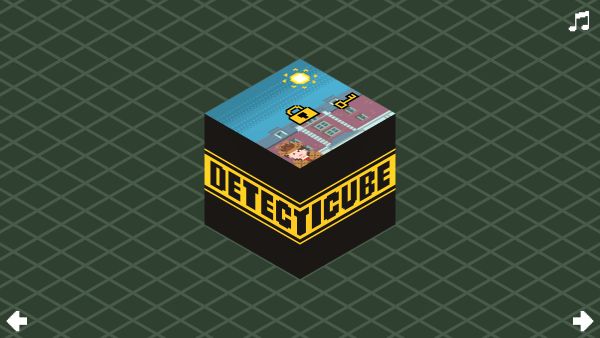
DETECTICUBE, an unfolding puzzle box with a deadly mystery inside...
On the flipside, kazu and Shibo have also made games with no language requirements at all. DETECTICUBE is a puzzle box type of game that is conveyed entirely through the charming pixel art graphics. Players poke around the different faces of the box as they unfold the mystery within. There is a sense of toylike physicality as you spin the box around and learn how its different parts fit together.
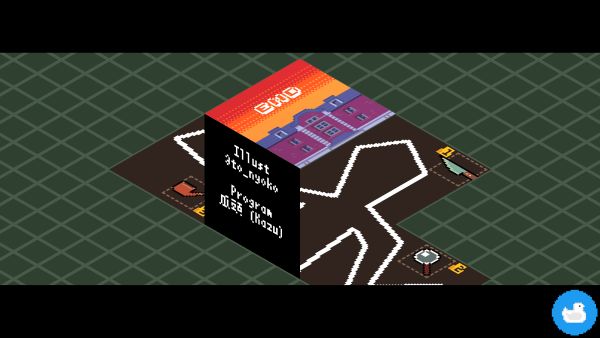
kazu and Shibo create excellent and satisfying games that can usually be played in a single session.
These are just a few of kazu and Shibo’s games, all of them infused with a ton of creativity and playfulness. Their use of bold, vibrant pixel art with tactile game mechanics brings to mind playing with toys or board game pieces. Because a lot of their games were created for jams, they tend to be compact yet full experiences, and cover a wide breadth of themes and ideas. Browsing their library is a bit like rifling through the board game shelves at a local shop. No matter which one you pull down, you’re guaranteed a good time.
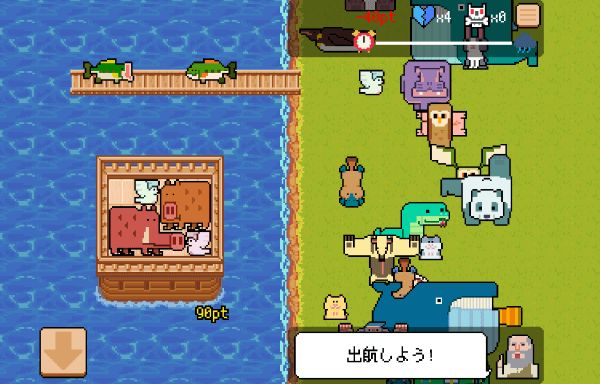
NOW SHIPPING, a quirky puzzle game where you play as Noah arranging pairs of animals onto the boats before the waters rise. But make sure none of the animals get eaten!
If there are unifying themes across kazu and Shibo’s games, it is their distinctive artwork, easy-to-understand rules, and brain-tickling riddles that make me want to talk about them with other people. I can imagine the two of them working on these games together by sharing new ideas to delight the other, and that sense of infectious joy comes across in their games as well. Whenever I play a new game of theirs, I cannot help but share it with everyone I know.
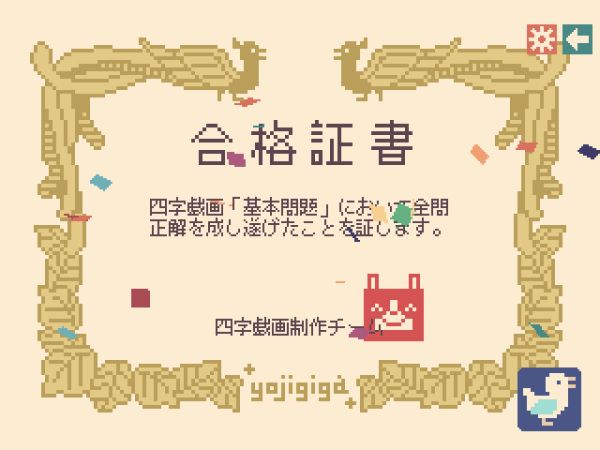
If you are in the mood for a fun game but don’t have a lot of time, I highly recommend diving into the toybox that is kazu and Shibo’s library of games. Their works really capture that charm of bite-sized yet incredibly full experiences.
